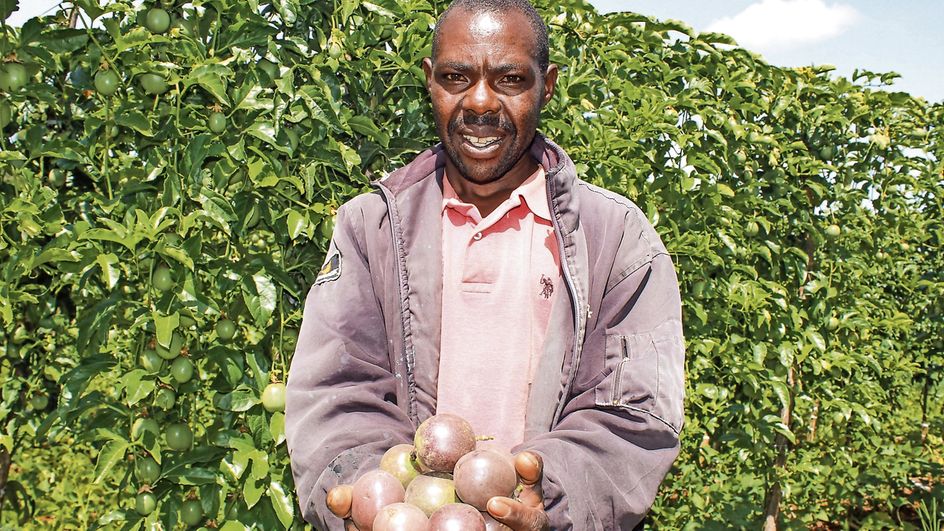
About four kilometres from Sogomo trading centre along the Eldoret-Ziwa road is Kapndani village. Like most parts of Uasin-Gishu County, maize cultivation is popular here.
However, some farmers – like Isaac Kipkosgei – are charting a new path. His 0.8-acre farm is dotted with hundreds of passion fruit plants neatly hanging over well-arranged poles and intercropped with beans.
“This is the purple variety of passion. Most people prefer this variety and it is grafted from a root stock of the yellow passion,” Kipkosgei told the Seeds of Gold team as he plucked a ripe fruit.
The farmer, who previously worked as a private security guard in Eldoret town, said he was attracted to the crop due to the good returns.
He had toyed with the idea of growing maize but one his close friends discouraged him against it. Kipkosgei used to earn a paltry Sh4,500 per month from his work. In 2012, he spent Sh2,000 from his salary on seeds and sunk holes on a parcel of land he got from his father. He planted 900 plants but 100 of them died.
“I had heard about the good returns from the crop but I felt it was labour-intensive and expensive, compared to maize. But my friend encouraged me to go into passion fruit farming,” Kipkosgei said.
In April 2013, he quit his job to venture fully into farming. “One day, I asked my wife how much she made from selling passion fruits and I was surprised when she said over Sh5,000 in a week. That is how I ended up resigning from my job to concentrate on my farm; a decision I don’t regret,” said the 38-year-old farmer.
He started serious farming with a cumulative seed capital of Sh100,000, which he channelled into labour, seeds, poles, wire and other expenses.
In a good season, Kipkosgei harvests between 300 and 500 kilogrammes of passion fruit in a week, which earns him up to Sh1 million in a season.
Buoyed by good returns, the following year, he increased acreage by leasing one-and-a- half acres of land. “Even though we had a good market, I later realised the brokers or middlemen manipulated the weighing machines. For instance, the machine could be reading 300 kilogrammes. However, wheren I insisted on re-weighing, it showed 500 kilogrammes,” he said.
GUARANTEED MARKET
Kipkogei said there is a guaranteed market for his produce as he sell the fruits to traders from Nairobi and Kampala at between Sh80 and Sh120 per kilogramme.
From the proceeds, the farmer said he has been able to buy six dairy cows, construct a permanent house and buy a half-acre land in Kaptarakwa, where he planted another batch of 600 plants last year.
To plant the crop, the farmer usually propagates the seeds in a seedbed. He places a sack underneath and another sack on top.
With regular watering, it takes two to three weeks to sprout and after another three weeks transplants the seedlings to the tubes. In two to three months, he transplants into the prepared holes.
“The sack on the bottom prevents other plants from sprouting and the passion fruit’s roots from touching the ground. The sack on top controls the amount of water,” said Kipkosgei, who dropped out at Standard Five.
He sinks holes two-and-a-half metres deep and one-and-a-half metres apart and leaves them for three months before planting the crop. After eight months, he starts to harvest for six months to a year.
However, the travel restrictions owing to the Covid-19 pandemic have reduced demand for his fruits. He now sells at between Sh40 and Sh70 per kilogramme.
Some of the challenges include pests and diseases like pest woodiness, blight and stem rust. To curb soil-borne diseases, the farmer practices crop rotation by planting maize crop.
He also sprays the crop after every two weeks and weeds after one or two months.
Josephine Simiyu, manager in charge of Compliance and Regulatory Services at Horticultural Crops Directorate, said for a farmer to reap maximum benefits from passion fruit farming, one must have well drained, medium-textured loam soils and avoid swampy areas.
“A farmer must also carry out soil analysis to ensure the right pH for passion fruits production (5.5-6.5), use certified planting materials and ensure proper nutrition for the crop as per soil analysis recommendations,” she said.
The expert recommends that farmers should plant certified virus-free seedlings from recognised horticulture nurseries to improve yields and prevent pests and diseases.
“Farmers should also avoid intercropping with crops that may harbour nematodes and those that are susceptible to cucumber mosaic virus. They should also use yellow passion rootstock, which are tolerant to nematodes,” she explained, adding that one must also ensure proper management practices such as spacing, pruning and trellising to allow light aeration and reduce pest and disease infestation.
“Grafted seedlings have a number of advantages that range from tolerance to soil-borne diseases such as fusarium wilt; have vigorous rooting system capable of efficient water and nutrient absorption; long crop economic life span; and higher yields,” Simiyu said.



